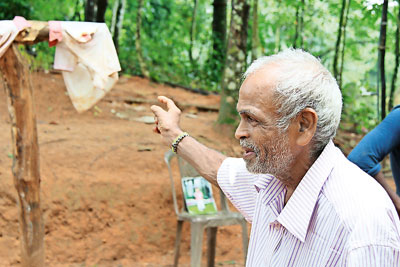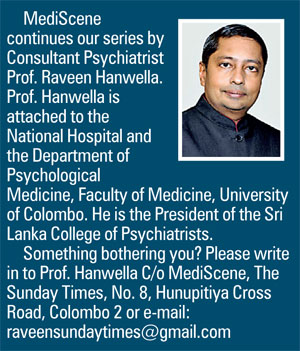After a disaster: Picking up psychologically
View(s):By Prof. Raveen Hanwella
A great disaster is a symbol to us to remember all the big things of life and forget the small things of which we have thought too much. -Jawaharlal Nehru
In the background of the devastation caused by the recent floods and landslides I thought it useful to discuss the psychological after-effects of a disaster and what can be done to help in the immediate aftermath.

Matugama: An old man tearfully points to the site where his two young grandchildren, who died in a landslide in the area are buried. Pic by Indika Handuwala
A disaster or trauma is an adverse event outside normal human experience and is different to a stress such as loss of a job or failure at an examination, a minor traffic accident or even divorce. In a disaster there is usually loss of life or threat of danger to life either to yourself or to a family member, a friend or part of your community. Victims of such disasters, along with their family can show a number of symptoms, which typically develop in a sequence.
In the first or impact phase, the persons feel stunned and numb, experience a sense of disbelief as to what has happened, feel fearful and confused even to the point of disorganisation. The second or crisis phase follows where individuals start to feel the impact. They experience physical symptoms like headache, fatigue or dizziness as well as emotional symptoms like anger, irritability apathy and social withdrawal. There may be anger against caregivers or organisations perceived as not providing sufficient help.
In the third or resolution phase grief, guilt and depression is prominent. This may last upto one year as individuals attempt to cope with their losses. With time, persons enter the fourth phase of reconstruction. Here there is reappraisal or reassignment of meaning and integration of the event into a new concept of self. All persons do not necessarily graduate to this phase and may get stuck in any of the previous phases. Such persons will need professional help to move on.
Almost all normal people after a trauma will pass through these stages but only a minority of victims will develop a post stress psychiatric disorder such as Acute Stress Disorder (ASD) or Post-traumatic Stress Disorder (PTSD).
What psychological help does a person need after a trauma? Some years ago a type of therapy for post trauma victims called Critical Incident Stress Debriefing (CISD) became popular. CISD was originally developed to assist first responders such as police, fire department and health care workers. It was not meant for survivors of disaster or their relatives. However it became a popular form of post trauma intervention especially by non-medical mental health workers. To debrief is to ask a series of questions about something that happened, such as after a military mission or an adverse event that has occurred. In CISD the victim is asked to recall details of the incident, repeatedly going through the process until more and more details are recalled. It was thought that this process enabled people to restructure their thinking processes and gain a more realistic evaluation of the traumatic event. It was supposed to prevent later psychological complications such as depression, anxiety and post-traumatic stress disorder (PTSD). However subsequent research showed that CISD did not prevent such after-effects and in some it worsened symptoms.
Only a minority of persons develop a psychiatric disorder after a trauma. The majority are distressed and need a different kind of help than formal psychiatric services. The manual titled Psychological First Aid: Guide for Field Workers published by the WHO (downloadable free of charge) gives valuable advice. Field workers need not be psychiatrists but those with some basic training preferably working with supervision by the local psychiatrist.
 The first step in psychological first aid (PFA) is to help people address their basic needs and access services. The priority is to ensure safety. Especially after a natural disaster where the danger continues, it is important to ensure that the affected persons are made safe. Afterwards they should be helped to obtain basic needs such food, water, shelter, and basic sanitation. The specific needs of people should be identified such as medical care, clothing and items for feeding small children. Ensure that vulnerable or marginalised groups such as women, persons with mental illness, or those from different religious or ethnic backgrounds are not overlooked.
The first step in psychological first aid (PFA) is to help people address their basic needs and access services. The priority is to ensure safety. Especially after a natural disaster where the danger continues, it is important to ensure that the affected persons are made safe. Afterwards they should be helped to obtain basic needs such food, water, shelter, and basic sanitation. The specific needs of people should be identified such as medical care, clothing and items for feeding small children. Ensure that vulnerable or marginalised groups such as women, persons with mental illness, or those from different religious or ethnic backgrounds are not overlooked.
Second, people should be helped to cope with problems. After a disaster those affected often feel overwhelmed with worries and fears. Help persons to identify their most important concerns leaving others to be dealt with later. Identifying a few issues to manage helps people to feel more in control and strengthens coping abilities. If people wish to talk about their experiences, be willing to listen but do not force them to talk or encourage them for more details. As mentioned before, enforced debriefing or ventilation is harmful. Persons can be asked to identify persons among their friends and family who can help them in the present situation.
Ask people what normally helps them in a crisis and facilitate positive coping strategies and discourage negative ones. Positive coping strategies are getting adequate sleep and rest, eating and drinking water as regularly as possible, talking with family and friends, talking about problems with someone you trust, doing activities that help you relax such as singing, physical exercise and doing religious activities and finding ways to help others affected in the community. Some negative coping strategies would be drinking alcohol, smoking or taking drugs, sleeping the whole day, working without rest, isolating one’s self from friends and family, neglecting personal hygiene and being violent.
The third step is to accurately inform about the event, the loved ones affected and the best way to access the services available. Getting accurate information in a crisis is not easy. The situation is usually volatile and rumours may abound. It is important to make every effort to obtain accurate and current information to keep people updated as the situation unfolds. You should take care not to make up information or give false information. It will undermine credibility and trust and hamper efforts to help. The messages should be simple, free from jargon and repeated to ensure they are understood. When possible give the information in a group to ensure that everybody hears the same message.
Fourth, help people to connect with their loved ones and get social support. Studies show that people who felt supported during a crisis ultimately fared better that those who felt unsupported. Therefore linking people with their loved ones is an important component of PFA. In a crisis situation, a person’s religious or spiritual beliefs help to face grief and suffering, give a sense of meaning and hope. However, remember that sometimes when people face great tragedy they may question their religious beliefs and become even more distressed. Be aware of and respect person’s religious beliefs and listen respectfully without imposing your personal religious beliefs on the person.
Finally, it is important to understand that PFA is a short-term intervention and when the time is right, you have to leave. Ensure that this is explained to the persons affected and they are helped to connect with the ongoing and follow-up services that will attend to their future needs. Bid goodbye in a positive manner. Recall the words of Jawaharlal Nehru after the assassination of MahatmaGandhi that I quoted at the beginning of this article – remember all the big things of life and forget the small things of which we have thought too much.


